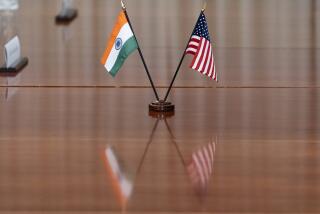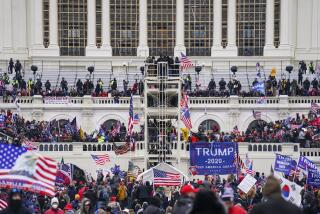Case Against Sheik Worries Some Officials : Probe: Investigators say they are gambling on taped conversations and informant to prove plot. Others say evidence demands prosecution.
- Share via
NEW YORK — For weeks, federal investigators privately voiced their doubts about the quality of the evidence supporting the government’s case against Sheik Omar Abdul Rahman, the blind cleric accused of leading a loose-knit group of Islamic terrorists.
But in the end, Atty. Gen. Janet Reno overcame her own misgivings, as well as those of her subordinates, and concluded that the alleged conspiracy was “a case that had to be prosecuted,” according to one of several sources familiar with the matter.
The decision was made to move forward, and the full scope of the investigation became clear this week. On Thursday, Abdul Rahman and 14 of his followers were indicted for allegedly conspiring to conduct terrorist acts here and abroad, including the Feb. 26 bombing that closed the World Trade Center in New York.
It is a high-stakes bet, according to present and past government officials involved in counterterrorism work. If the government loses its case against Abdul Rahman, actual and would-be terrorists may be emboldened to orchestrate new attacks, convinced that they will be able to get away with them.
Although convinced that members of the New York group had worked together to engage in terrorism, investigators were troubled by apparent ambiguities in tape recordings of the sheik’s conversations. They also were uncomfortable with their heavy reliance on the credibility of a former bodyguard for the sheik who became a government informant.
But U.S. Atty. Mary Jo White eventually convinced Reno that the best bet was to prosecute the case as a single, ongoing conspiracy responsible for both the slaying of Jewish Defense League founder Meir Kahane in 1990 and the World Trade Center bombing this year, as well as aborted plots to blow up other New York landmarks and to assassinate Egyptian President Hosni Mubarak.
“The debate all along has been, is there really enough there?” said a senior law enforcement official who requested anonymity. “In the last couple of months, nothing has come along to make the case any stronger.”
Such reservations may have figured in Reno’s decision two months ago not to authorize the immediate arrest of Abdul Rahman. But that decision was also said to be based on “sound law enforcement reasons.” Allowing Abdul Rahman to remain free helped pull together the other alleged plotters, often in the company of the government’s chief informant.
A source familiar with the case discounted suggestions that the decision to seek the indictments reflected the emergence of new evidence gleaned from more than 150 hours of recordings.
Many of the tapes were made by the informant, Emad Ali Salem, who was equipped with a hidden recording device.
Once the decision was made to prosecute the group, it was clear that Abdul Rahman had to be part of the case, said a source familiar with the evidence.
Otherwise, “the other defendants could say: ‘The Devil made me do it,’ and you don’t have the Devil in the dock,” the source said.
“How can you go after an organization and its members without going after the individual you describe as a leader?” another official asked rhetorically.
U.S. officials insist they never seriously debated the alternative of simply deporting Abdul Rahman--who signaled his willingness to go to Afghanistan--even though prosecuting the cleric might lead to reprisals by Muslim fundamentalists who revere him.
“You indict when the evidence warrants it, and in this case the evidence seemed clear,” said a source in the U.S. attorney’s office in Manhattan. “You can’t worry about reprisals resulting from prosecutions, whether it’s Mafia dons or terrorists. Otherwise, you wouldn’t indict anyone.”
The sheik’s followers in Egypt have already warned of reprisals as a result of the indictments. “We will take revenge on all U.S. interests and citizens, either in Egypt or outside, if any harm occurs to Sheik Omar,” three major Egyptian radical groups said in a joint statement, according to the Associated Press.
The groups were identified as Gamaa al Islamiya (Islamic Group), the Vanguards of Conquest, and Islamic Jihad (Holy War).
Harry C. Batchelder Jr., the sheik’s defense lawyer, said the U.S. government “was under tremendous pressure by the Egyptian government to get him indicted here. The Egyptians don’t want him back, and this is the perfect answer for them.”
An Egyptian arrest warrant is outstanding for Abdul Rahman, but it involves a 1989 anti-government demonstration--a crime that does not appear to satisfy the U.S. extradition treaty with Egypt, according to Justice Department sources.
In charging Abdul Rahman and the 14 others on conspiracy charges, the government used one of the favorite tools of prosecutors. Rather than having to prove specific terrorist acts, the government can win by showing a pattern of conduct by the defendants as they allegedly plotted together to commit terrorism.
Moreover, in a federal conspiracy case, prosecutors can introduce hearsay evidence--accounts by witnesses of what other people told them--that would not be admissible in a non-conspiracy case.
Thus, prosecutors can introduce statements, some buttressed by recordings, made to Salem by defendants about actions by others charged in the case.
Ostrow reported from Washington; Jackson from New York.
More to Read
Get the L.A. Times Politics newsletter
Deeply reported insights into legislation, politics and policy from Sacramento, Washington and beyond. In your inbox twice per week.
You may occasionally receive promotional content from the Los Angeles Times.










